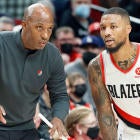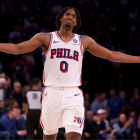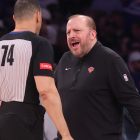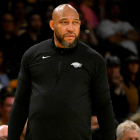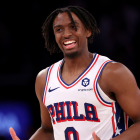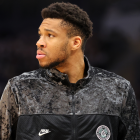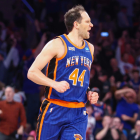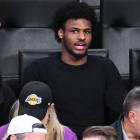
The 2020-21 Milwaukee Bucks, in what was a fairly slow start by their standards, won 16 of their first 24 games a season ago. The 2019-20 Los Angeles Lakers lost on opening night… and then went 24-2 in their next 26. The 2018-19 Toronto Raptors were 12-1 after their 13 games. The list goes on and on. It's by no means impossible to win a championship after a slow start, but recent history suggests that the best teams, including the three most recent NBA champions, come out of the gate hot.
There are a number of explanations for why that might be the case, but the simplest is that great teams tend to be great all season and the beginning of the season is part of the season. Teams frequently improve as seasons progress, especially in the super team era, but there comes a point at which a team's record, its statistics and its overall caliber of play stop being small sample aberrations and start becoming the truth of who that team is. So let's look at four teams that have underperformed thus far this season and try to figure out how serious their early-season struggles have been starting with the defending champions.

CBS Sports HQ Newsletter
Your Ultimate Guide to Every Day in Sports
We bring sports news that matters to your inbox, to help you stay informed and get a winning edge.
Thanks for signing up!
Keep an eye on your inbox.
Sorry!
There was an error processing your subscription.
Milwaukee Bucks
Record: 6-6
Panic meter: 2 out of 10
The Bucks get a '2' here primarily due to the cold, unforgiving nature of the standings. When seeding is determined it won't matter how the Bucks lost six early games, just that they did, and considering Milwaukee's nearly-spotless 10-1 postseason record last spring, home-court advantage is going to be fairly important for the Bucks. That will be especially true if Kyrie Irving ever returns to the Nets. Brooklyn has two games on Milwaukee right now. That means something.
But nothing else that has happened to the Bucks this season does. Aside from Giannis Antetokounmpo, the Bucks have gotten only 372 minutes out of their four other expected starters. The Knicks, who they defeated Wednesday, have two individual players who have topped that figure (Julius Randle at 430 and RJ Barrett at 410) along with a third who has come fairly close in Evan Fournier (353). We know next to nothing about the healthy Bucks because we haven't seen the healthy Bucks. For now, most preseason assumptions about them should remain intact.
If anything, there are a few positive developments that should be noted. Grayson Allen thriving as a starter makes the two-year, $20 million extension he signed last month look like a downright bargain. The Bucks are .500 despite ranking only 18th in 3-point percentage only a year after finishing fourth. There is significant room for improvement here once the regulars get healthy. In terms of what they've actually done on the court, there's no reason to panic here.
Boston Celtics
Record: 5-6
Panic meter: 6 out of 10
Most of these teams are operating on a relatively short sample. We're through less than 20 percent of the season, but Boston's entire 2020-21 campaign was littered with the same issues plaguing this current group. There's still a lack of offensive cohesion late in games. Their shooting still looks better in theory than reality (likely due to limited individual playmaking). Robert Williams has seemingly solved his fouling problem, but continues to make befuddling mistakes that mask his remarkable athletic upside. None of the other youngsters have even earned 20 minutes per game.
The notion that there's some fundamental flaw in building around two score-first wings is misguided. Boston's struggles are the result of years of talent drain. The Celtics poured significant assets into Kyrie Irving. He left for nothing. They poured significant cap space into Gordon Hayward. He left for nothing. They poured just as much cap space into Kemba Walker. They had to give up a first-round pick to get rid of him. These things add up. Boston's problem isn't its two best players. It's all of the other players it expected to have and currently don't.
This is fixable given time. It's not as if the rest of the roster is defective. Add a point guard. Figure out which of the youngsters are keepers. Consolidate the rotation. It's way too early to panic about Boston's long-term outlook. They still have two All-Stars in their mid 20s. But it's more than fair to start panicking about their 2021-22 season. With last season backing it up, this current core just isn't talented enough to compete at the level that the Celtics did before the talent drain of 2019 and 2020 set in.
Atlanta Hawks
Record: 4-8
Panic meter: 7 out of 10
Atlanta is a victim of its own success to an extent. No, 4-8 was never going to be an acceptable start, but reaching the Eastern Conference finals last season warped expectations to an unhealthy degree. Atlanta was, and probably still is, a ways off from genuine championship contention under normal circumstances. It landed on the right side of the bracket and benefitted from injury luck last season. Realistically, the Hawks probably weren't going to make it as far this season even if they had improved as a team.
But they've regressed meaningfully. Perhaps their 27-11 mark under Nate McMillan last season was a bit ambitious, but a team as deep as Atlanta should have benefitted from a wide-open Eastern Conference. It obviously hasn't, and some of the ways in which it's struggling are more concerning than others. Trae Young struggling to adjust to the NBA's new officiating style was predictable, but the Hawks are still scoring 111 points per 100 possessions with him on the floor. He's still a driver of elite team offense even if he's not as dominant individually.
Defense is more concerning. Atlanta's path to a remotely acceptable postseason defense ran through Clint Capela. He was an All-Defense candidate a season ago. This year, Atlanta's defense has been over 18 points per 100 possessions better with him on the bench. Those stats are misleading to an extent, especially since he shares so many minutes with Young, but his 4.2 percent block rate is among the lowest of his career and the Hawks as a team are allowing opponents to shoot 69.7 percent in the restricted area compared to 63.6 percent a year ago. The Hawks need a great Capela to defend at a championship level. Right now, they have a decent Capela.
That's been the overarching concern with this roster. De'Andre Hunter looked like a blossoming star a year ago. We're still seeing those flashes, but on balance, he hasn't taken the step Atlanta needed him to take. Cam Reddish is playing his best basketball as a professional, but that's not saying enough. The Hawks are a remarkably deep team in terms of starting-caliber players, but there's an enormous gap between Young and everyone else on this roster even factoring in his free throw concerns. The Hawks need to solve that problem if they're ever going to make it back to the Eastern Conference finals.
Portland Trail Blazers
Record: 5-7
Panic meter: 8 out of 10
The whole concern is greater than the sum of its parts in Portland. Damian Lillard struggled early on … but he's largely gotten back on track over the past three games. The defense was ranked No. 22 through 11 games … but allowed the second-highest open 3-point percentage in the NBA and the fifth-highest wide-open 3-point percentage. Luck should help Portland in those respects. The bench has struggled … but the starting lineup has played the fourth-most minutes of any five-man unit in basketball and has posted a strong plus-7.7 net rating together after thriving last season. The component parts here shouldn't raise as many alarms as the actual on-court results seem to, yet it's hard to deny the sense of disappointment surrounding the start to this season.
The staleness of the situation doesn't help. All of these problems, save Lillard's struggles, are fairly standard in Portland. The model throughout Lillard's tenure has been great offense overcoming poor defense and strong starters lifting poor reserves. The same is true this season. It will probably be true next season. Holes grow over time. Problems that once felt fixable start to feel inevitable. The definition of insanity is doing the same thing over and over again and expecting different results.
That's where we're headed in Portland, except it's not truly possible to do the same thing over and over again in the NBA. Players age. Players get expensive. Anfernee Simons is having his best season as a pro. He's also set for restricted free agency this offseason. Jusuf Nurkic and Robert Covington are inching toward unrestricted free agency as well. Neither is playing his best defensively. The roster, by and large, remains small. Small players tend not to age fairly well.
If Portland is OK hovering around .500 and losing in the first two rounds indefinitely, this isn't particularly concerning. As we've covered, there's room for improvement here, but it's improvement only to where the Blazers have been in previous seasons. Nothing that has happened thus far this season suggests that they've unlocked something new, that they've found a way to overcome their previous limitations. That might not bother Lillard, who has recently hinted that he plans to stay in Portland regardless, but it should probably bother the organization. Is .500 really something to aspire to?
Thus far, a coaching change hasn't fixed what ails this team. As Lillard ages and the role players move toward free agency, time to find a cure is running out. Eventually, this team is going to have to try something more drastic. Until they figure out what that is, they'll remain stuck exactly where they've been for the past half decade: outside of true contention.













